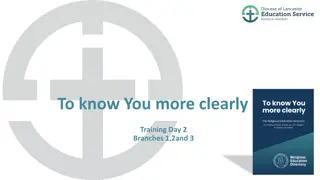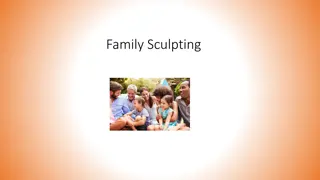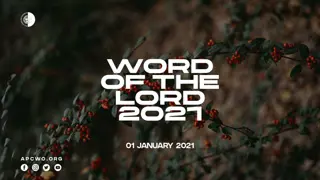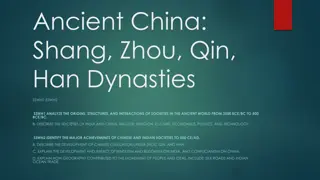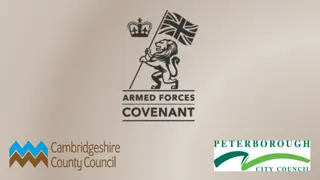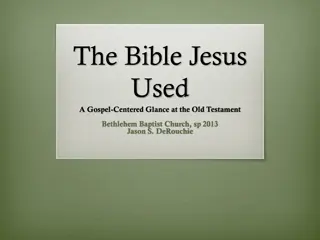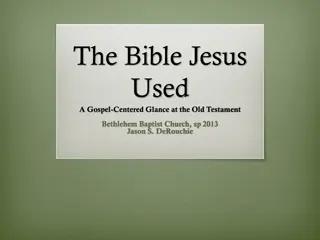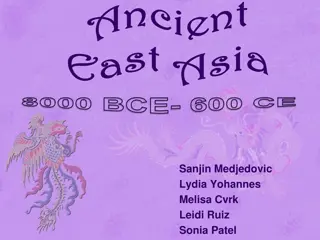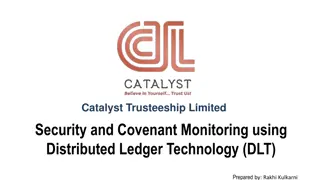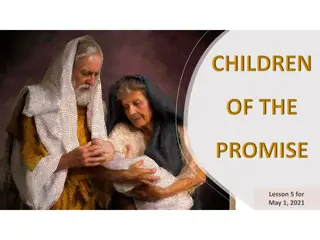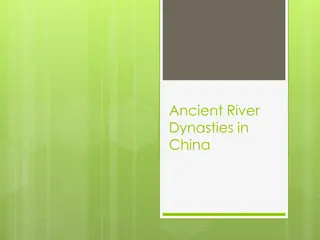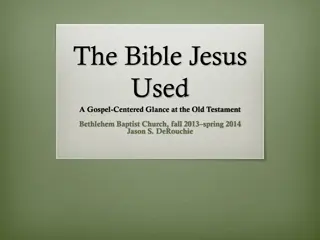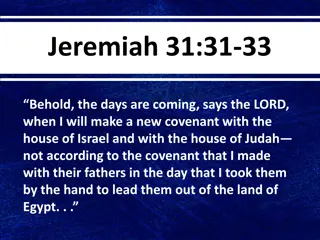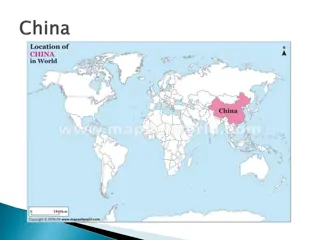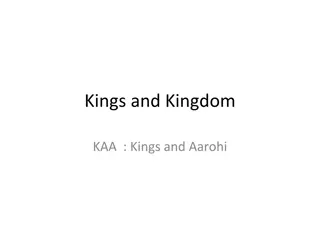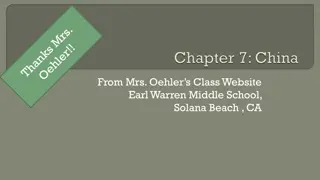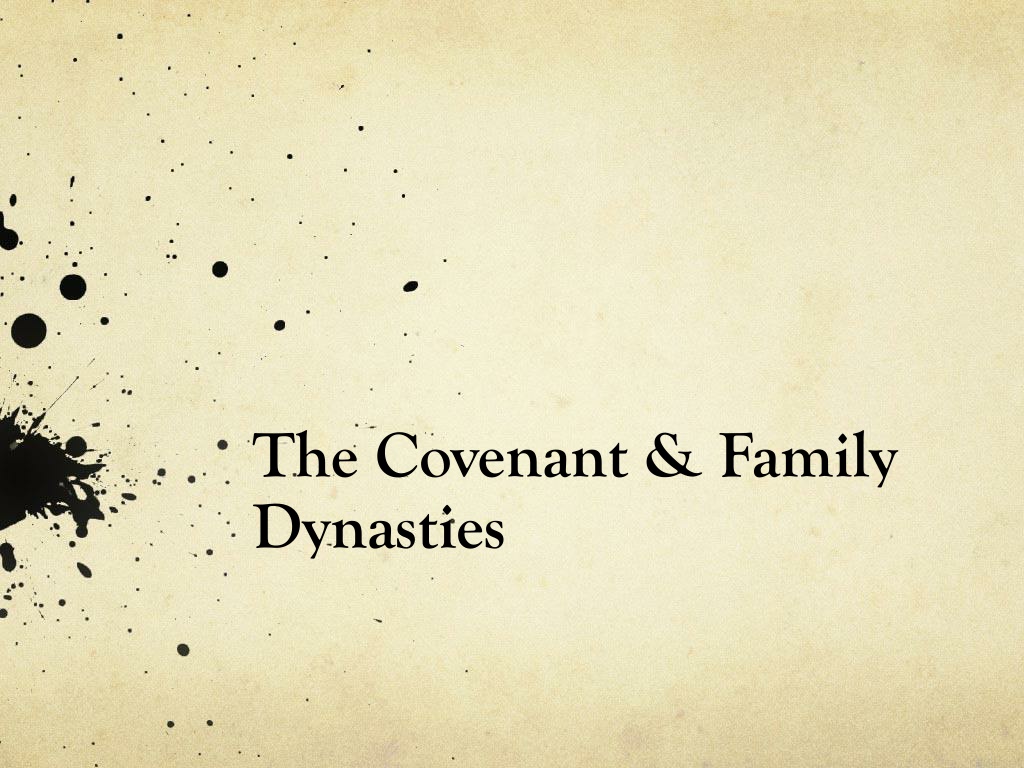
Understanding Biblical Covenants and Family Dynamics
Explore the significance of Biblical covenants in family legacies, focusing on the impact of key figures like Abraham and the essence of family multiplication for lasting significance. Discover the core elements and applications of covenants for family missions.
Download Presentation

Please find below an Image/Link to download the presentation.
The content on the website is provided AS IS for your information and personal use only. It may not be sold, licensed, or shared on other websites without obtaining consent from the author. Download presentation by click this link. If you encounter any issues during the download, it is possible that the publisher has removed the file from their server.
E N D
Presentation Transcript
The Covenant & Family Dynasties
If you were to assess the fruit of Abrahams life, what percentage of his fruitfulness was achieved by all the work he did during his life verses what he accomplished through the single act of having Isaac? The comparison is almost absurd. Virtually all his fruitfulness came through Isaac. - Jeremy Pryor
How many activities in your typical week are focused on multiplication? Family activities like having children, adopting children, training children and grandchildren, developing repeatable family traditions are all highly fruitful and if done well, will out live you by many centuries. And this, by the way, is the secret to fathers falling in love with their families. Once fathers truly grasp the insignificance of identifying with their work and the lasting significance of raising a family their hearts will finally come home. (italics mine) - Jeremy Pryor
Housekeeping Items Written presentation transcripts Quoted authors test everything; hold on to the good Q & A at end of sessions
The Covenant & Family Dynasties
Outline 1. Background 2. Exposition of the 5 Parts of a Biblical Covenant 3. 3 Phases of Succession 4. Definitions of a Biblical Covenant 5. Covenant Applicable to Families? 6. Covenant is Context of Family Mission
Background 1. Covenant or Covenants : a Structure 2. Biblical Teaching on Covenant is like The Trinity 3. Ray Sutton s 5-part structure of the Covenant 4. Deuteronomy a paradigm-model
Deuteronomy But how do we know Deuteronomy is a covenant? Moses says, He declared to you His covenant which He commanded you to perform, that is, the Ten Commandments [Words] (Deut. 4:13). Deuteronomy is the second giving of the Ten Commandments, a new covenant so to speak. Moses says of the book as a whole, Keep the words of this covenant to do them, that you may prosper in all that you do (Deut. 29:9). Deuteronomy is definitely a covenant document. - Ray Sutton, That You May Prosper
The 5 Parts to a Biblical Covenant Acronym: THEOS Transcendence (Deut. 1:1-5) Hierarchy (Deut. 1:6 - 4:49) Ethics (Deut. 5-26) Oath (aka, Sanctions, Ratification) (Deut. 27-30) Succession (aka, Continuity) (Deut. 31-34)
Transcendence A biblical covenant begins with a preamble where God declares His transcendence. This does not mean God is distant, but that He is distinct. It is a declaration of his Lordship; His absolute sovereign authority. Deut. 1: 1-5: The Deuteronomic covenant begins with a declaration of transcendence, when it says, Moses spoke to the children of Israel according to all that the Lord commanded him to give to them (Deut. 1:3). The covenant declares God s Lordship by distinguishing God s words from Moses .
Transcendence Isaiah 45: 5-7 I am the Lord, and there is no other, besides me there is no God; I equip you, though you do not know me, that people may know, from the rising of the sun and from the west, that there is none besides me; I am the Lord, and there is no other. I form light and create darkness, I make well-being and create calamity, I am the Lord, who does all these things.
Transcendence - Principles Principle of Creation Unlike pagan views, there is a distinction between Creator and creation. Only a Creator God relates covenantally with His creation. Principle of Transcendence AND Immanence No other being is fully transcendent, so no other being is universally present. God alone is omnipresent (present everywhere). God is near, not by being of a similar essence as us (pagan), but by means of the covenant.
Transcendence CREATOR / CREATURE FIGURE 1 CREATOR COVENANT CREATURE
Transcendence - Principles Principle of Legal Declaration (Judicial Imputation) Covenant is created by a legal-ethical declaration Think of Adam and Abraham Think of marriage covenant Principle of Personal Relationship Legal foundation of relationship does not imply an impersonal relationship, but rather the opposite: All God s relationships are personal precisely because they are covenantal. Remember, God comes near by means of covenant. Again, the marriage relationship should prove this.
Pagan / Non-Transcendence CHAIN OF BEING (ALL LIFE OF SAME ESSENCE TO GREATER OR LESSER DEGREES) GOD AT TOP (PURE BEING) FIGURE 1 LEFT SIDE OF CHAIN OF BEING IRRATIONALISM (MYSTICISM = PURE BEING RIGHT SIDE OF CHAIN OF BEING RATIONALISM (LOGIC = PURE BEING MAN IN MIDDLE (LESS BEING) (WESTERN MAN HAS TENDED MORE TOWARD THIS EXPRESSION OF BEING THEOLOGY) (EASTERN MAN HAS TENDED TOWARD THIS EXPRESSION OF BEING THEOLOGY) DEMONS AT BOTTOM (NON BEING) EVOLUTIONARY WORLDVIEW (BEING THEOLOGY ON ITS SIDE) FIGURE 2 NON BEING MAN SPIRT PRE-EXISTENT MATTER MORE BEING PURE BEING GOD
Hierarchy Deuteronomy 1:6 4:49 Sample: Deut. 1:15 So I took the heads of your tribes, wise and experienced men, and set them as heads over you, commanders of thousands, commanders of hundreds, commanders of fifties, commanders of tens, and officers, throughout your tribes. If God is transcendent, the true Covenantal Suzerain, then He establishes His authority on earth. He makes His Lordship visible by establishing representatives, a hierarchy. He establishes delegated authority . Biblical hierarchy is a series of courts with delegated authorities over each level. The procedure is from the bottom up.
The 3 Covenantal Institutions The 3 Covenantal Institutions on earth: Family, Church, and State. The 3 Symbols of Accountability How God Rules through His Earthly Representatives The Sword: State (capital punishment) The Keys: Church (baptism/communion: entrance/excommunication) The Rod: Family (discipline, education)
Ethics Deuteronomy 5-26 Ethics: The Cause/Effect Principle God establishes an ethical relationship between cause and effect. He dictates the terms (commandments) under which man can have an ethical relationship with Him. These terms are the standard of the covenant. Man is called to be faithful to God by submitting to them. If he submits (covenant-keeping), he is blessed. If he does not (covenant-breaking) he is cursed. He is either a covenant-keeper or a covenant-breaker. Biblical religion is based on faithfulness to the Word of God (ethics). Pagan religion is always some form of manipulation through one means or another -- magic, manipulation (state power), mysticism, etc.
Ethics and Dominion The formula for victory is simple: keep the covenant and dominion will be the proper effect. The key to success is not a secret in the Bible. It is revealed, and it is illustrated time and again. - Sutton, That You May Prosper Deut. 7: 12-16: And because you listen to these rules and keep and do them, the Lord your God will keep with you the covenant and the steadfast love that he swore to your fathers. 13 He will love you, bless you, and multiply you. He will also bless the fruit of your womb and the fruit of your ground, your grain and your wine and your oil, the increase of your herds and the young of your flock, in the land that he swore to your fathers to give you. 14 You shall be blessed above all peoples. There shall not be male or female barren among you or among your livestock. 15 And the Lord will take away from you all sickness, and none of the evil diseases of Egypt, which you knew, will he inflict on you, but he will lay them on all who hate you. 16 And you shall consume all the peoples that the Lord your God will give over to you. Your eye shall not pity them, neither shall you serve their gods, for that would be a snare to you.
Oath or Sanctions Deuteronomy 27-30 This is perhaps the most complex section of the covenant. While the term sanction typically has a negative connotation, in this context, the sanction is not only for cursing for disobedience, but also blessing for obedience. Think, consequences either good or bad. This aspect of the biblical covenant could also be called ratification. A ceremony is held in the presence of witnesses where a self-maledictory oath [a death curse] is taken thereby binding God s people to the terms of the covenant He initiated. The key words to note here are blessing and cursing, ratification, ceremony, oath, and witnesses.
Oath/Sanctions -- Examples Genesis 15 God with Abraham The marriage ceremony till death do us part.
Additional Oath Points Sanctions are blessing and cursing. Blessing always has to do with the reception of inheritance (Gen. 48:1-22 [Ephraim & Manasseh]). This inheritance is personal and cultural, everything from holiness to financial and civilizational prosperity (Deut. 28:1-4). There is one covenant with two sanctions (blessing and cursing). There are not two covenants, one being law and the other promise ( grace ). In terms of the biblical covenant structure, pitting law against grace in this particular way is a false dichotomy. The oath is made by faith but not to the exclusion of certain symbols of faith.
Additional Oath Points WITNESSES: Witnesses make the ratification official. They testify to the fact that a covenant was actually made (the recipient s potential lack of seriousness does not nullify the covenant being made and the sanction applying to him). If the covenant is broken, the witnesses could be called forward to prosecute the covenant-breaker (called a covenant lawsuit). - Deut. 30:19: I call heaven and earth to witness against you this day. ADOPTION: The ratification process creates a transfer of name and is functionally an adoption. Cutting covenant adopts the initiate into the Kingdom of God. He receives a new name and inheritance.
Succession (Continuity, Inheritance) Deuteronomy 31-34 This final component of the covenant provides the mechanism for the covenant to be transferred from generation to generation. It is based on the principle of inheritance.
3 Phases of Succession 1. Covenant Renewal: Looks to the Past 2. Conquest: Looks to the Present 3. Discipleship: Looks to the Future
Another Expression of the 5 Parts: 1. Who s in charge here? 2. To whom do I report? 3. What are the rules? 4. What do I get for obeying or disobeying? 5. Does this outfit have a future?
Definitions of a Biblical Covenant the fundamental image behind each of the applications of [the word covenant in the Bible] is the use of familial categories for those who are not bound by ties of natural kinship. Thus, by a ceremony or (quasi-) legal process, people who are not kin are now bound as tightly as any family relationship. Marriage is the best example of this. A man and woman, who are not previously related, are now bound closer than any other bond of blood or kinship.
Definitions of a Biblical Covenant A covenant is an enduring agreement which defines a relationship between two parties involving a solemn, binding obligation specified on the part of at least one of the parties toward the other, made by oath under threat of divine curse, and ratified by a visual ritual.
Covenant Applicable to Families? The ability to call down and carry out God s judgment and sanctions (blessings and curses) is what makes an institution covenantal. The only examples given in the Bible that have such authority to invoke God s judgments are the family, church, and state (civil government). All answer to God Himself. They are bound in a legal bond or covenant that is ratified in an oath to Him. - John G. Crawford.
Covenant Applicable to Families? Malachi 2:14: Yet you say, For what reason? Because the Lord has been witness between you and the wife of your youth with whom you have dealt treacherously; Yet she is your companion, and your wife by covenant. Proverbs 2:17: Who forsakes the companion of her youth, and forgets the covenant of her God.
Covenant Applicable to Families? for this reason a man will leave his father and mother and be united to his wife. Leaving ( azab) implies the termination of a covenant bond, the same Hebrew word being used of apostasy from the covenant. The covenant being ended is the parental bond. A new covenant or bond is formed by cleaving (dabaq). The parental relationship is temporary and the marital covenant is permanent. -- Ray Sutton
Covenant Context for Dominion Mission Man is the divine image. As servant king and son of God mankind will mediate God s rule to the creation in the context of a covenant relationship with God on the one hand and the earth on the other. Hence the concept of the kingdom of God is found on the first page of Scripture. Indeed, the theme is kingdom through covenant. Genesis 12 presents a political structure brought into being by the word of God, with God at the center and God as the governmental head and rule of that community. In other words, we have the kingdom of God brought into being by means of the covenant (i.e., the covenant between God and Abraham). Hence, we have kingdom through covenant. - Peter Gentry and Stephen Wellum in Kingdom Through Covenant
Covenant Context for Dominion Mission After we have assessed the covenant, we need to ask, How does it work? It is my thesis that covenant is the mechanism for dominion and success. After all, Moses says, Keep the words of this covenant to do them, that you may prosper in all that you do (Deut. 29:9). If we really believe the Bible, then covenant is the key to daily living at every level. Some Christians do not understand their Commission from the Lord. It is a renewal of the cultural mandate; it has the covenantal structure; it means Christians are to take dominion by means of the covenant. - That You May Prosper: Dominion By Covenant; by Ray Sutton
Definition A Christian multigenerational [ dynasty-building ] family is a family incorporated on the foundation of covenant marriages and covenantal obligations to children, extended over multiple generations, centered around a mission for the family received from God, with the responsibility of preserving, expanding, and most importantly, successfully transmitting that missional-faithfulness to every succeeding generation of the family.


